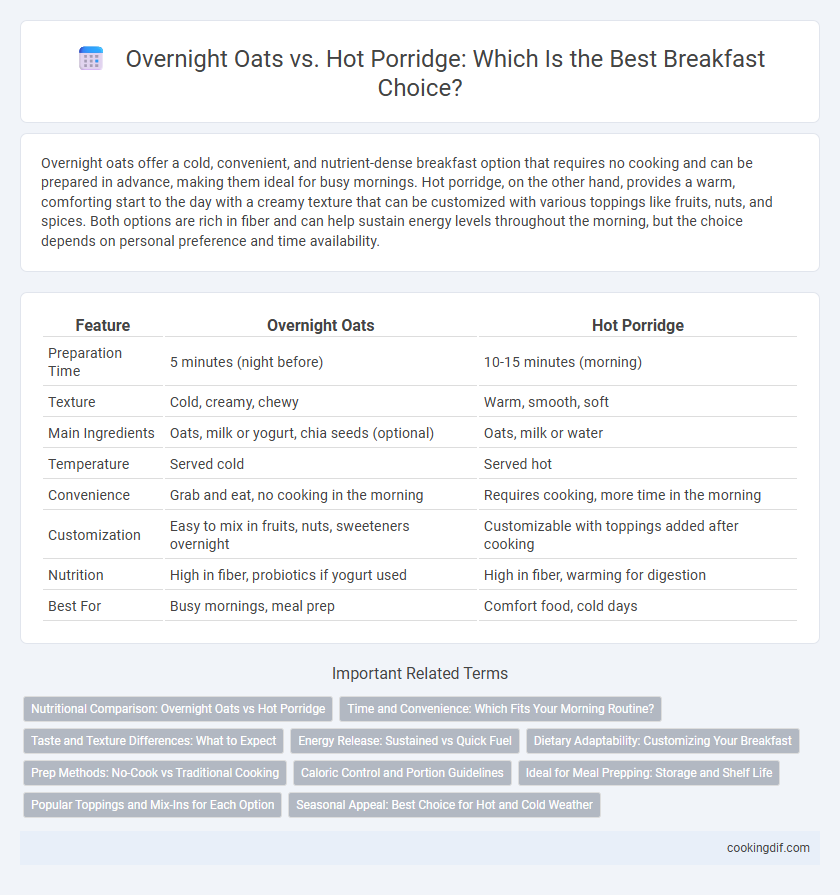Overnight oats offer a cold, convenient, and nutrient-dense breakfast option that requires no cooking and can be prepared in advance, making them ideal for busy mornings. Hot porridge, on the other hand, provides a warm, comforting start to the day with a creamy texture that can be customized with various toppings like fruits, nuts, and spices. Both options are rich in fiber and can help sustain energy levels throughout the morning, but the choice depends on personal preference and time availability.
Table of Comparison
| Feature | Overnight Oats | Hot Porridge |
|---|---|---|
| Preparation Time | 5 minutes (night before) | 10-15 minutes (morning) |
| Texture | Cold, creamy, chewy | Warm, smooth, soft |
| Main Ingredients | Oats, milk or yogurt, chia seeds (optional) | Oats, milk or water |
| Temperature | Served cold | Served hot |
| Convenience | Grab and eat, no cooking in the morning | Requires cooking, more time in the morning |
| Customization | Easy to mix in fruits, nuts, sweeteners overnight | Customizable with toppings added after cooking |
| Nutrition | High in fiber, probiotics if yogurt used | High in fiber, warming for digestion |
| Best For | Busy mornings, meal prep | Comfort food, cold days |
Nutritional Comparison: Overnight Oats vs Hot Porridge
Overnight oats retain more nutrients due to minimal heat exposure, preserving sensitive vitamins like vitamin B complex and antioxidants. Hot porridge offers better absorption of starches and may enhance digestive benefits by breaking down fiber. Both provide high fiber and complex carbohydrates, but overnight oats often contain more protease inhibitors and resistant starch beneficial for gut health.
Time and Convenience: Which Fits Your Morning Routine?
Overnight oats require minimal morning preparation since they are soaked overnight, offering a quick grab-and-go breakfast ideal for busy schedules. Hot porridge demands cooking time in the morning, typically 5-10 minutes, making it less convenient for early rush hours but providing a warm, comforting start. Choosing between them depends on whether time efficiency or a freshly cooked meal better fits your morning routine.
Taste and Texture Differences: What to Expect
Overnight oats offer a creamy, smooth texture with a naturally sweet, slightly tangy taste due to the soaking process, providing a cold and refreshing breakfast option. Hot porridge, typically made from oats cooked with boiling water or milk, delivers a warm, comforting, and thick consistency with a more pronounced oat flavor and a softer texture. Taste differences arise from the temperature and preparation methods, with overnight oats retaining a fresher, milder flavor while hot porridge emphasizes warmth and hearty richness.
Energy Release: Sustained vs Quick Fuel
Overnight oats provide a sustained energy release due to their high fiber content and complex carbohydrates, promoting steady blood sugar levels throughout the morning. Hot porridge, especially when freshly cooked, delivers quicker fuel as the heat breaks down starches, allowing faster digestion and rapid glucose availability. Choosing between the two depends on whether you need prolonged energy or immediate morning fuel.
Dietary Adaptability: Customizing Your Breakfast
Overnight oats offer exceptional dietary adaptability by allowing customization with various plant-based milks, fruits, nuts, and seeds, catering to vegan and gluten-free diets effortlessly. Hot porridge, traditionally made from oats or other grains, can be tailored with protein powders, spices, and dairy or dairy alternatives, fitting low-carb or high-protein nutritional plans. Both options provide flexible platforms for incorporating superfoods and dietary supplements, optimizing breakfast for individual nutritional needs and preferences.
Prep Methods: No-Cook vs Traditional Cooking
Overnight oats require no-cook preparation by soaking oats in liquid ingredients overnight, allowing the grains to absorb moisture and soften naturally. Hot porridge involves traditional cooking methods, where oats are simmered with water or milk on a stove to achieve a creamy texture. The no-cook method offers convenience and preservation of nutrients, while the cooked version enhances flavor and warmth.
Caloric Control and Portion Guidelines
Overnight oats offer a convenient, calorie-controlled breakfast option by allowing precise measurement of ingredients, typically ranging from 150 to 300 calories per serving depending on the mix-ins. Hot porridge, when prepared with water or low-fat milk, usually contains around 100 to 250 calories per portion, with portion size recommendations between 200 to 250 grams to maintain caloric control. Both options support portion guidelines that emphasize balance, with overnight oats enabling customization for nutrient-dense add-ins while hot porridge facilitates easy adjustments through toppings and cooking liquids.
Ideal for Meal Prepping: Storage and Shelf Life
Overnight oats offer superior convenience for meal prepping due to their cold storage stability, typically lasting up to five days in the refrigerator without compromising texture or flavor. Hot porridge, while freshly prepared, has a shorter shelf life and requires reheating, which can alter consistency and nutritional quality. For efficient breakfast planning, overnight oats provide a practical solution with extended shelf life and easy grab-and-go options.
Popular Toppings and Mix-Ins for Each Option
Overnight oats commonly include toppings like fresh berries, chia seeds, nuts, and a drizzle of honey, providing a cold, creamy texture with added crunch and sweetness. Hot porridge often features warm mix-ins such as cinnamon, brown sugar, sliced bananas, and toasted nuts, creating a comforting, hearty breakfast rich in flavor and warmth. Both options can be customized with protein powders, dried fruits, or nut butters to enhance nutrition and taste.
Seasonal Appeal: Best Choice for Hot and Cold Weather
Overnight oats offer a refreshing, cold breakfast option ideal for warm weather, providing a nutrient-dense, no-cook meal that can be customized with fresh fruits and nuts. Hot porridge delivers comforting warmth and energy during colder months, with oatmeal's soluble fiber enhancing satiety and metabolic health. Seasonal appeal favors overnight oats in summer due to their cooling nature, while hot porridge remains a classic winter choice for its heat retention and hearty texture.
Overnight oats vs Hot porridge for breakfast Infographic

 cookingdif.com
cookingdif.com